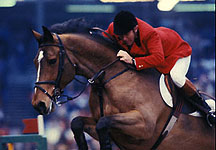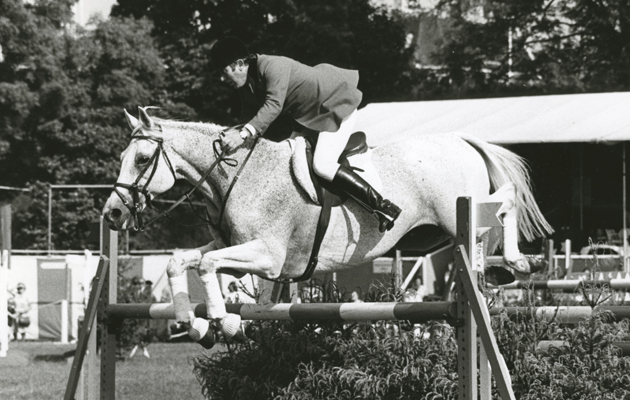From his early days on a dairy farm to the giddy heights of the Olympics, David Broome is one of Britain’s finest ever showjumpers. Penny Richardson charts his career
It’s almost impossible to imagine it now, but in the 1960s and ’70s families sat down in front of their TVs in their millions to watch a young Welsh showjumper and his counterpart from Yorkshire take on and beat the rest of the world.
In those heady days of prime-time showjumping on the BBC, everyone had heard of David Broome and Harvey Smith. They were national heroes whose exploits in and out of the ring made the sort of headlines now reserved for other sports.
The public adored David Broome. In 1960, he was only 20 when he was voted Sportsview Sports Personality of the Year. In 2007, he received a “National Treasure” award from Alan Titchmarsh’s ITV show and only seven years ago, ITV Wales broadcast a documentary on David’s life.
{"content":"PHA+U28gd2hhdCBtYWRlIHRoaXMgdW5hc3N1bWluZyBtYW4gc3VjaCBhIGxlZ2VuZD8gSW4gdGhlIDE5NTBzLCBzaG93anVtcGluZyB3YXMgb2Z0ZW4gY29uZmluZWQgdG8gcGVvcGxlIGZyb20gcHJpdmlsZWdlZCBiYWNrZ3JvdW5kcy4gVGhlbiBhbG9uZyBjYW1lIERhdmlkIGFuZCBIYXJ2ZXkuIFRoZXkgYXJlIG9mIGEgc2ltaWxhciBhZ2Ug4oCTIERhdmlkIHR1cm5lZCA4MCBsYXN0IG1vbnRoLCB3aGlsZSBIYXJ2ZXkgaXMganVzdCBvdmVyIGEgeWVhciBvbGRlciDigJMgYW5kIG5laXRoZXIgd2FzIGZyb20gYSDigJx0eXBpY2Fs4oCdIGVxdWVzdHJpYW4gZmFtaWx5LjwvcD4KPHA+RGF2aWQgTWNQaGVyc29uIEJyb29tZSBDQkUgd2FzIGJvcm4gaW4gQ2FyZGlmZiwgdGhlIHNvbiBvZiBGcmVkIEJyb29tZSBhbmQgaGlzIFNjb3R0aXNoIHdpZmUsIE1pbGxpZS4gQWx0aG91Z2ggRnJlZCB3YXMgYSBncmVlbmdyb2NlciwgaGlzIGZhdGhlciBoYWQgd29ya2VkIHdpdGggaG9yc2VzLjwvcD4KPHA+PGRpdiBjbGFzcz0iYWQtY29udGFpbmVyIGFkLWNvbnRhaW5lci0tbW9iaWxlIj48ZGl2IGlkPSJwb3N0LWlubGluZS0yIiBjbGFzcz0iaXBjLWFkdmVydCI+PC9kaXY+PC9kaXY+PHNlY3Rpb24gaWQ9ImVtYmVkX2NvZGUtMzEiIGNsYXNzPSJoaWRkZW4tbWQgaGlkZGVuLWxnIHMtY29udGFpbmVyIHN0aWNreS1hbmNob3IgaGlkZS13aWRnZXQtdGl0bGUgd2lkZ2V0X2VtYmVkX2NvZGUgcHJlbWl1bV9pbmxpbmVfMiI+PHNlY3Rpb24gY2xhc3M9InMtY29udGFpbmVyIGxpc3RpbmctLXNpbmdsZSBsaXN0aW5nLS1zaW5nbGUtc2hhcmV0aHJvdWdoIGltYWdlLWFzcGVjdC1sYW5kc2NhcGUgZGVmYXVsdCBzaGFyZXRocm91Z2gtYWQgc2hhcmV0aHJvdWdoLWFkLWhpZGRlbiI+DQogIDxkaXYgY2xhc3M9InMtY29udGFpbmVyX19pbm5lciI+DQogICAgPHVsPg0KICAgICAgPGxpIGlkPSJuYXRpdmUtY29udGVudC1tb2JpbGUiIGNsYXNzPSJsaXN0aW5nLWl0ZW0iPg0KICAgICAgPC9saT4NCiAgICA8L3VsPg0KICA8L2Rpdj4NCjwvc2VjdGlvbj48L3NlY3Rpb24+PC9wPgo8cD7igJxNeSBncmFuZGZhdGhlciB3YXMgY29hY2htYW4gdG8gYSB2ZXQgaW4gUGVtYnJva2UgYW5kIHdhcyBpbiBhIGNhdmFscnkgcmVnaW1lbnQgZHVyaW5nIFdvcmxkIFdhciBJLiBGYXRoZXIgaW5oZXJpdGVkIGhpcyBsb3ZlIG9mIGhvcnNlcyBhbmQgdGhlcmUgd2FzIGFsd2F5cyBhIGhvcnNlIG9yIHR3byBhcm91bmQs4oCdIHJlbWVtYmVycyBEYXZpZC4g4oCcTXkgcGFyZW50cyB3ZXJlIHJlYWwgZ3JhZnRlcnMuIEZhdGhlciBoYWQgYSBncmVlbmdyb2NlcuKAmXMgc2hvcCBpbiBDYXJkaWZmIGFuZCwgaW4gV29ybGQgV2FyIElJLCBoZSBhbHNvIHdvcmtlZCBmb3IgdGhlIGZpcmUgc2VydmljZSBhdCBDYXJkaWZmIGRvY2tzLiBIZSB1c2VkIHRvIGdvIHRvIHRoZSB3aG9sZXNhbGVycyBldmVyeSBtb3JuaW5nLCBidXkgdGhlIGdvb2RzLCB0aGVuIGdvIHRvIGhpcyBvdGhlciBqb2Igd2hpbGUgTW90aGVyIHJhbiB0aGUgc2hvcC7igJ08L3A+CjxwPkZyZWQgYWx3YXlzIGRyZWFtdCBvZiBiZWluZyBhIGZhcm1lciBhbmQgdGhlIGZhbWlseSBtb3ZlZCB0byBhIGRhaXJ5IGZhcm0gbmV4dCB0byBDaGVwc3RvdyByYWNlY291cnNlLjwvcD4KPHA+4oCcRmF0aGVyIGhhZCBhIGRhaXJ5IGhlcmQsIGJ1dCBtaWxraW5nIGJvdGggZW5kcyBvZiB0aGUgZGF5IGdvdCB0aGUgYmV0dGVyIG9mIGhpbS4gSGUgdHVybmVkIHRvIGJ1eWluZyBhbmQgc2VsbGluZyBob3JzZXMgYW5kIHBvbmllcyBhbmQgdGhhdCBidXNpbmVzcyBncmV3LiBIZSBzdXBwbGllZCB0aGUgY29icyBmb3IgdGhlIExvbmRvbiBtaWxrIGZsb2F0IHRyYWRlLCBidXQgaXQgd2FzIG1vc3RseSBwb25pZXMgaGUgd2FzIGtub3duIGZvcizigJ0gc2F5cyBEYXZpZC4g4oCcQW5uZSBIYW1tb25kIFthIHRvcCBicmVlZGVyIGFuZCBqdWRnZV0gZnJvbSBOZXdtYXJrZXQgd2FzIG9uZSBvZiBoaXMgYmlnZ2VzdCBjdXN0b21lcnMuIFNoZSBrZXB0IHJlY29yZHMgYW5kIHNoZSBlbmRlZCB1cCBidXlpbmcgNDY1IHBvbmllcyBmcm9tIERhZC7igJ08L3A+CjxkaXYgY2xhc3M9ImFkLWNvbnRhaW5lciBhZC1jb250YWluZXItLW1vYmlsZSI+PGRpdiBpZD0icG9zdC1pbmxpbmUtMyIgY2xhc3M9ImlwYy1hZHZlcnQiPjwvZGl2PjwvZGl2Pgo8cD5CZWZvcmUgZ29pbmcgdG8gdGhlaXIgbmV3IGhvbWVzLCBldmVyeSBwb255IHdhcyB0cmllZCBvdmVyIGZlbmNlcywgd2hpY2ggd2FzIERhdmlk4oCZcyBqb2IuIFRoZW4gaW4gMTk0NywgdGhlIGZhbWlseSBtb3ZlZCB0byB0aGUgTW91bnQgQmFsbGFuIE1hbm9yIGVzdGF0ZSBpbiB0aGUgTW9ubW91dGhzaGlyZSB2aWxsYWdlIG9mIENyaWNrLCB3aGljaCBpcyBzdGlsbCB0aGVpciBob21lLiBEYXZpZCBhbmQgaGlzIHlvdW5nZXIgc2libGluZ3MgTGl6LCBNYXJ5IGFuZCBGcmVkZXJpY2sgdGhlbiBoYWQgc3RyaW5ncyBvZiBwb25pZXMgdG8gY29tcGV0ZS48L3A+CjxwPuKAnEkgcm9kZSB0aGUgcG9uaWVzIGZpcnN0IGFuZCB0aGVuIHRoZXkgd2VyZSBwYXNzZWQgZG93bi4gVGhhdOKAmXMgaG93IHdlIGxlYXJudCBvdXIgdHJhZGUs4oCdIHNheXMgRGF2aWQuIOKAnExpeiB3YXMgMTAgdGltZXMgbW9yZSBtb3RpdmF0ZWQgdGhhbiBtZSBhbmQgaWYgSSBkaWRu4oCZdCB0cnkgaGFyZCBlbm91Z2gsIHNoZSBwaW5jaGVkIG15IHJpZGVzLiBTaGUgd2FzIHRoZSBvbmUgd2hvIGtpY2tlZCBteSBidW0gaW50byBnZWFyIeKAnTwvcD4KPGRpdiBjbGFzcz0iYWQtY29udGFpbmVyIGFkLWNvbnRhaW5lci0tbW9iaWxlIj48ZGl2IGlkPSJwb3N0LWlubGluZS00IiBjbGFzcz0iaXBjLWFkdmVydCI+PC9kaXY+PC9kaXY+CjxwPkRhdmlk4oCZcyByb2xlIG1vZGVsIHdhcyBoaXMgZmF0aGVyOiDigJxXZSBjYWxsZWQgTW90aGVyIG91ciDigJhwaWNuaWMgcGFja2Vy4oCZIGJlY2F1c2Ugc2hlIGxvb2tlZCBhZnRlciBldmVyeXRoaW5nIGF0IGhvbWUgd2hpbGUgd2UgdHJhdmVsbGVkIHRvIHNob3dzLiBXZSBwcm9iYWJseSBnb3QgaGVyIG9udG8gYSBob3JzZSB0d2ljZSwgYnV0IHJpZGluZyB3YXNu4oCZdCBmb3IgaGVyLiBGYXRoZXIgdHJhdmVsbGVkIHdpdGggbWUgZm9yIDE1IHllYXJzIGFuZCB3YXMgYSB3b25kZXJmdWwgaG9yc2VtYW4uIEhlIHVuZGVyc3Rvb2QgaG9yc2VzIGFuZCBJIGRvbuKAmXQga25vdyB3aGF0IEkgd291bGQgaGF2ZSBkb25lIHdpdGhvdXQgaGltLiBFdmVyeSB0aW1lIEkgcm9kZSwgSSBnb3QgYSBsZXNzb24gZnJvbSBGYXRoZXIuIEnigJl2ZSBuZXZlciByaWRkZW4gZm9yIHBsZWFzdXJlLiBJdOKAmXMgYWx3YXlzIGJlZW4gYSBqb2IgYW5kLCBiZWNhdXNlIHdlIG5lZWRlZCB0aGUgbW9uZXksIEZhdGhlciB0YXVnaHQgbWUgaG93IHRvIHdpbi7igJ08L3A+CjxwPlRoZSBkZWFsaW5nIGJ1c2luZXNzIGFsc28gaGVscGVkIHRoZSB5b3VuZyBEYXZpZCB0byBiZWNvbWUgYW4gYWRhcHRhYmxlIHJpZGVyLjwvcD4KPGRpdiBjbGFzcz0iYWQtY29udGFpbmVyIGFkLWNvbnRhaW5lci0tbW9iaWxlIj48ZGl2IGlkPSJwb3N0LWlubGluZS01IiBjbGFzcz0iaXBjLWFkdmVydCI+PC9kaXY+PC9kaXY+CjxwPuKAnEkgaGFkIHRocmVlIHBvbmllcyB3aG8gYWxsIHdlbnQgY29tcGxldGVseSBkaWZmZXJlbnRseSwgYnV0IHdlcmUgbGl0dGxlIGNsZWFyLXJvdW5kIG1hY2hpbmVzLOKAnSBoZSBzYXlzLiDigJxJbiB0aG9zZSBkYXlzLCB0aGVyZSB3YXMgbm9uZSBvZiB0aGlzIGFnYWluc3QtdGhlLWNsb2NrIGxhcmsuIEluc3RlYWQsIHRoZSBjbGFzc2VzIHdlcmUgYWxsIHRocmVlIHJvdW5kcyBhbmQgZXZlcnlvbmUgd2hvIGp1bXBlZCB0aHJlZSBjbGVhcnMgc2hhcmVkIGZpcnN0IHBsYWNlLiBBdCBtb3N0IHNob3dzLCBJIGVuZGVkIHVwIGp1bXBpbmcgbmluZSByb3VuZHMsIHdoaWNoIHdhcyB2ZXJ5IGhhcmQgd29yay4gV2UgaGFkIHR3byBzYWRkbGVzLCBzbyB0aGUgb25seSByZXN0IEkgZ290IHdhcyB3aGVuIHdlIGNoYW5nZWQgdGhlbSBvdmVyLuKAnTwvcD4KPGgzPkEgYmlnIGJyZWFrPC9oMz4KPHA+V2hlbiBEYXZpZCBtb3ZlZCBvbiB0byBob3JzZXMsIGhlIGdvdCBoaXMgYmlnIGJyZWFrIHRocm91Z2ggYSBnZWxkaW5nIGJvdWdodCBmb3IgwqM2MCBmcm9tIHRoZSBLaW5n4oCZcyBUcm9vcC4gV2lsZGZpcmUgd2FzIHN1cHJlbWVseSB0YWxlbnRlZCwgYnV0IGhhZCBsaXZlZCB1cCB0byBoaXMgbmFtZSB3aXRoIGEgbnVtYmVyIG9mIGRpZmZlcmVudCByaWRlcnMuIFdpdGggRGF2aWQsIGhlIHdlbnQgb24gdG8gYmVjb21lIEJyaXRhaW7igJlzIGxlYWRpbmcgbW9uZXkgd2lubmVyIGluIDE5NTkuPC9wPgo8cD7igJxIZSB3YXMgYSBuYXVnaHR5IGJveSB3aGVuIHdlIGZpcnN0IGdvdCBoaW0sIGJ1dCBoZSB3YXMgYWxzbyBhIHdvbmRlcmZ1bCBob3JzZSBhbmQsIGJ5IEdvZCwgSeKAmXZlIG9ubHkganVzdCByZWFsaXNlZCBob3cgbHVja3kgSSB3YXMgdG8gaGF2ZSBoaW0s4oCdIHNheXMgRGF2aWQuIOKAnEhl4oCZZCBiZWVuIHRyYWluZWQgZm9yIGV2ZW50aW5nLCBzbyBoaXMgZmxhdHdvcmsgd2FzIHN1cGVyYiBhbmQgaGUgd2FzIHNvIGJhbGFuY2VkIGFuZCBjYXJlZnVsLiBUaGUgY2xvY2sgaGFkIGp1c3QgYmVlbiBpbnRyb2R1Y2VkIGFuZCBiZWNhdXNlIFdpbGRmaXJlIHdhcyBzbyB3ZWxsIHNjaG9vbGVkLCB3ZSBwdWxsZWQgb2ZmIHR1cm5zIG5vIG9uZSBlbHNlIGNvdWxkIGF0dGVtcHQu4oCdPC9wPgo8cD5GcmVk4oCZcyBoZWxwIGFnYWluIHByb3ZlZCBpbnZhbHVhYmxlIHdoZW4gRGF2aWQgbW92ZWQgb24gdG8gdGhlIGhvcnNlIHNjZW5lLjwvcD4KPHA+4oCcSGUgb2Z0ZW4gd29ya2VkIG15IGhvcnNlcyBhbmQgd2hlbiBJIGdvdCBvbiB0aGVtLCB0aGV5IHdlcmUgYWxyZWFkeSByaWRpbmcgd2VsbCBhbmQgbW91dGhlZCB1cCzigJ0gc2F5cyBEYXZpZC4g4oCcRmF0aGVyIHdhcyBhbHNvIGluIGNoYXJnZSBvZiB0aGUgZmVlZGluZy4gRXZlcnkgaG9yc2UgZ290IG51dHMsIGJyYW4gYW5kIG9hdHMuIElmIHRoZXkgd2VyZSB0b28gc2hhcnAsIHRoZXkgZ290IGxlc3Mgb2F0cyBhbmQgaWYgdGhleSB3ZXJlIHN0dWZmeSB0aGV5IGdvdCBtb3JlLiBUaGF0IHdhcyBpdC7igJ08L3A+CjxwPkluIDE5NjAsIERhdmlkIGFuZCBXaWxkZmlyZSB3ZXJlIHNob3J0bGlzdGVkIGZvciB0aGUgUm9tZSBPbHltcGljcywgYnV0IGFyb3VuZCBzaXggd2Vla3MgYmVmb3JlIHRoZSBHYW1lcyBoZSBhY3F1aXJlZCBhIG5ldyBtb3VudC48L3A+CjxwPlN1bnNhbHZlIHdhcyBhIHRocmVlLXF1YXJ0ZXIgdGhvcm91Z2hicmVkIGJ5IHRoZSBISVMgUHJlbWl1bSBzaXJlIFNrb2l0ZXIuIEhlIHdhcyBvd25lZCBieSBoaXMgYnJlZWRlciwgT2xpdmVyIEFuZGVyc29uLCBhbmQgaGFkIGJlZW4gcmlkZGVuIHN1Y2Nlc3NmdWxseSBieSBPbGl2ZXLigJlzIGRhdWdodGVyLCBFbGl6YWJldGgsIHdpdGggd2hvbSBoZSB3b24gdGhlIFF1ZWVuIEVsaXphYmV0aCBJSSBDdXAgYXMgYSBzZXZlbi15ZWFyLW9sZC4gRWxpemFiZXRoIHJldGlyZWQgZnJvbSB0aGUgc2FkZGxlIGFmdGVyIGhlciBtYXJyaWFnZSwgYnV0IFN1bnNhbHZlIGhhZG7igJl0IGdlbGxlZCB3aXRoIGFueSBuZXcgcmlkZXIuPC9wPgo8cD7igJxJIGZpcnN0IHNhdyBoaW0gd2l0aCBQYXQgU215dGhlIGluIHRoZSBPbHltcGljIHRyaWFsIGF0IE5pbmlhbiBQYXJrLCBDYXJkaWZmLiBUaGV5IHdvbiwgYnV0IEZhdGhlciBzYWlkIFN1bnNhbHZlIHdvdWxkIG5ldmVyIGp1bXAgZm9yIFBhdCBhZ2Fpbi4gSGUgd2FzIHJpZ2h0LiBUaGV5IHdlcmUgZWxpbWluYXRlZCBhdCB0aGVpciBuZXh0IHR3byBzaG93cyBhbmQgd2hhdCBGYXRoZXIgbWVhbnQgd2FzIHRoYXQgaW5zdGVhZCBvZiBQYXQgY29udHJvbGxpbmcgU3Vuc2FsdmUsIGhlIGhhZCBjb250cm9sIG9mIGhlcizigJ0gcmVtZW1iZXJzIERhdmlkLiDigJxXZSBkZWxpdmVyZWQgYSBiYXRjaCBvZiBwb25pZXMgdG8gQW5uZSBIYW1tb25kIGFuZCBGYXRoZXIgYXNrZWQgaGVyIGlmIHNoZSBrbmV3IHRoZSBBbmRlcnNvbiBmYW1pbHkgZnJvbSBOb3Jmb2xrLCBhcyBoZSB3YXMgd29uZGVyaW5nIGlmIHRoZXkgbmVlZGVkIGEgcmlkZXIgZm9yIFN1bnNhbHZlLiBBbm5lIHBob25lZCBPbGl2ZXIsIHdlIHdlbnQgdG8gc2VlIGhpbSwgRmF0aGVyIGFuZCBoZSBnb3Qgb24gZmFtb3VzbHkgYW5kIEkgZ290IHRoZSByaWRlLuKAnTwvcD4KPHA+V2l0aGluIGEgZm9ydG5pZ2h0LCB0aGUgbmV3IHBhaXIgaGFkIHdvbiB0aGUgS2luZyBHZW9yZ2UgViBDdXAgYXQgdGhlIFJveWFsIEludGVybmF0aW9uYWwuIFRoZXkgd2VyZSB0aGVuIHNlbGVjdGVkIGZvciB0aGUgT2x5bXBpY3MsIHdoZXJlIHRoZXkgYnJvdWdodCBob21lIGJyb256ZSwgQnJpdGFpbuKAmXMgZmlyc3QgZXZlciBpbmRpdmlkdWFsIHNob3dqdW1waW5nIE9seW1waWMgbWVkYWwuIEZhbW91c2x5LCB0aGV5IHdlcmUgYW1vbmcgb25seSB0d28gcGFpcnMgdG8gY2xlYXIgYW4gYWxtb3N0IHVuanVtcGFibGUgdHJlYmxlIGNvbWJpbmF0aW9uIHdpdGggYSBvbmUtYW5kLWEtaGFsZi1zdHJpZGUgZGlzdGFuY2UgYmV0d2VlbiB0aGUgZmluYWwgdHdvIGVsZW1lbnRzLjwvcD4KPHA+4oCcU3Vuc2FsdmUgd2FzIGFuIHVuYmVsaWV2YWJsZSBob3JzZSBhbmQgSSB3YXMgaW5jcmVkaWJseSBsdWNreSB0byBnZXQgaGltIGF0IGV4YWN0bHkgdGhlIHJpZ2h0IHRpbWUgaW4gbXkgY2FyZWVyLiBIZSBoYWQgdG8gYmUgcmlkZGVuIHdpdGggdGhlIGZsYWlyIG9mIHlvdXRoLiBCeSB0aGF0LCBJIG1lYW4geW91IGhhZCB0byBsZXQgaGltIHRoaW5rIGhlIHdhcyBpbiBjaGFyZ2UuIEhlIGhhZCB0byBkbyBpdCBoaXMgd2F5IGFuZCBoYWQgSSBiZWVuIG9sZGVyIGFuZCBtb3JlIGV4cGVyaWVuY2VkLCBJIG1pZ2h0IGhhdmUgdHJpZWQgdG8gY2hhbmdlIHRoYXQsIHdoaWNoIHdvdWxkIG5ldmVyIGhhdmUgd29ya2VkLOKAnSBzYXlzIERhdmlkLjwvcD4KPGgzPuKAmEhlIHRob3VnaHQgaGUgd2FzIHRoZSBraW5n4oCZPC9oMz4KPHA+QSBzZWNvbmQgT2x5bXBpYyBtZWRhbCBjYW1lIERhdmlk4oCZcyB3YXkgaW4gMTk2OCwgd2hlbiBoZSB0cmF2ZWxsZWQgdG8gTWV4aWNvIHdpdGggdGhlIE1hc3NhcmVsbGEgZmFtaWx54oCZcyBNciBTb2Z0ZWUsIGFscmVhZHkgdGhlIHdpbm5lciBvZiB0d28gRXVyb3BlYW4gQ2hhbXBpb25zaGlwIHRpdGxlcy48L3A+CjxwPuKAnE1yIFNvZnRlZSBoYWQgYSBiaWcgb3BpbmlvbiBvZiBoaW1zZWxmLiBIZSB0aG91Z2h0IGhlIHdhcyB0aGUga2luZyBhbmQgaGUgd2FzIHJpZ2h0LOKAnSBzYXlzIERhdmlkLjwvcD4KPHA+QWZ0ZXIgRGF2aWQgdG9vayBpbmRpdmlkdWFsIGJyb256ZSBpbiB0aGUgb3BlbmluZyBjb21wZXRpdGlvbiBhbmQgdGVhbW1hdGUgTWFyaW9uIE1vdWxkIChuw6llIENvYWtlcykgd29uIHNpbHZlciB3aXRoIGhlciBmYWJ1bG91cyBwb255IFN0cm9sbGVyLCB0aGUgdGhyZWUtbWFuIEJyaXRpc2ggc3F1YWQgaGFkIGEgaHVnZSBsZWFkIGdvaW5nIGludG8gcm91bmQgdHdvIG9mIHRoZSB0ZWFtIGNvbXBldGl0aW9uLiBNciBTb2Z0ZWUganVtcGVkIHR3byBncmVhdCByb3VuZHMsIGFzIGRpZCBIYXJ2ZXkgU21pdGjigJlzIE1hZGlzb24gVGltZS4gVGhlbiBkaXNhc3Rlci4gU3VmZmVyaW5nIGZyb20gYSB0b290aCBpbmZlY3Rpb24sIFN0cm9sbGVyIHdhcyBlbGltaW5hdGVkIGFuZCBCcml0YWluIHdlbnQgb3V0LjwvcD4KPHA+4oCcV2Ugd2VyZSBoZWFydGJyb2tlbi4gV2UgZmluaXNoZWQgdXAgd2l0aCBub3RoaW5nIGFmdGVyIHRoZSBnb2xkIG1lZGFsIHdhcyBzbyBuZWFybHkgaW4gb3VyIGhhbmRzLOKAnSBzYXlzIERhdmlkLCBydWVmdWxseS48L3A+CjxwPkZvdXIgeWVhcnMgbGF0ZXIsIERhdmlkIHdhcyBmbGFnYmVhcmVyIGZvciB0aGUgQnJpdGlzaCB0ZWFtIGF0IHRoZSBNdW5pY2ggT2x5bXBpY3MsIGJ1dCBoZSBoYWQgdG8gZW5kdXJlIGEgMTYteWVhciBicmVhayBiZWZvcmUgYW5vdGhlciBPbHltcGljIGFwcGVhcmFuY2UuPC9wPgo8cD5Vbmxpa2UgbWFueSBvdGhlciBuYXRpb25zLCBCcml0YWluIGhhZCBmb2xsb3dlZCB0aGUgc3Bpcml0IG9mIHRoZSBsYXcgYW5kIG91ciB0b3AgcmlkZXJzIHdlcmUgcnVsZWQgaW5lbGlnaWJsZSBmb3IgdGhlIEdhbWVzIGFzIHRoZXkgd2VyZSBqdW1waW5nIGZvciBwcml6ZS1tb25leSBhbmQgY2xhc3NlZCBhcyBwcm9mZXNzaW9uYWwuIFRoZSBydWxlIHdhcyBldmVudHVhbGx5IGNoYW5nZWQsIGFuZCBpbiAxOTg4IERhdmlkIHdlbnQgdG8gaGlzIGZpbmFsIE9seW1waWNzLCBpbiBTZW91bC4gSGUgY2FtZSBjbG9zZSB0byB0d28gbW9yZSBtZWRhbHMsIHJpZGluZyBDb3VudHJ5bWFuIGludG8gZXF1YWwgZm91cnRoIHBsYWNlIGluZGl2aWR1YWxseSBhbmQganVzdCBtaXNzaW5nIG91dCBvbiB0ZWFtIGJyb256ZS48L3A+CjxwPkJ5IHRoaXMgdGltZSwgRGF2aWTigJlzIG5hbWUgd2FzIGxpbmtlZCB3aXRoIExvcmQgSGFycmlzLCBub3cgb3duZXIgb2YgU2NvdHQgQnJhc2jigJlzIGhvcnNlcyBhbmQgd2l0aCB3aG9tIERhdmlkIGhhcyBlbmpveWVkIGEgNTEteWVhci1hbmQtY291bnRpbmcgZnJpZW5kc2hpcC4gSXQgd2FzIERhdmlkIHdobyBzdWdnZXN0ZWQgSGVsbG8gU2FuY3RvcyBhcyBhIHBlcmZlY3QgcmlkZSBmb3IgU2NvdHQuPC9wPgo8cD7igJxJIGZpcnN0IG1ldCBQaGlsIEhhcnJpcyBpbiBCYXJjZWxvbmEgaW4gMTk2OS4gSSB3YXMgb24gdGhlIFtOYXRpb25zIEN1cF0gdGVhbSB3aXRoIEdlb3JnZSBIb2Jicywgd2hvIHRoZW4gcm9kZSBmb3IgaGltLCBhbmQgUGhpbCBzYWlkIGhl4oCZZCBsaWtlIHRvIGJ1eSBtZSBhIGhvcnNlLOKAnSBzYXlzIERhdmlkLiDigJxJdCB0b29rIGEgeWVhciB0byBmaW5kIG9uZSBhbmQgdGhhdCBkaWRu4oCZdCB0dXJuIG91dCB2ZXJ5IGdvb2QuIEhlIHRoZW4gcGVyc3VhZGVkIG1lIHRvIHNlbGwgaGltIFNwb3J0c21hbiwgd2hvIGJlY2FtZSBvbmUgb2YgbXkgYmVzdCBldmVyIGhvcnNlcy7igJ08L3A+CjxwPkxvcmQgSGFycmlzIGFsc28gb3duZWQgUGhpbGNvLCBhbm90aGVyIG9mIERhdmlk4oCZcyBzdXBlcnN0YXIgcmlkZXMuPC9wPgo8cD7igJxJbiAxOTcyLCBbZGVhbGVyXSBGcmFuayBLZXJuYW4sIFBoaWwgYW5kIEkgdHJhdmVsbGVkIHRvIEFtZXJpY2EgdG8gdHJ5IGFub3RoZXIgaG9yc2Us4oCdIHNheXMgRGF2aWQuIOKAnFRoYXQgb25lIHdhc27igJl0IHN1aXRhYmxlLCBzbyBGcmFuayBzdWdnZXN0ZWQgd2UgbG9vayBmb3IgYSB5b3VuZyBob3JzZSB0byBhdm9pZCB3YXN0aW5nIG91ciBqb3VybmV5LiBQaGlsY28gd2FzIHRoZSB0YWxrIG9mIHRoZSBzaG93LiBSb2RuZXkgSmVua2lucyBoYWQgbWFuYWdlZCB0byBidXkgaGltIG9ubHkgdGhlIGRheSBiZWZvcmUsIGJ1dCBQaGlsIHBlcnN1YWRlZCBSb2RuZXkgdG8gcGFydCB3aXRoIGhpbS48L3A+CjxwPuKAnE15IGxpZmUgY2VydGFpbmx5IGNoYW5nZWQgZm9yIHRoZSBiZXR0ZXIgb24gdGhlIGRheSBJIG1ldCBQaGlsLuKAnTwvcD4KPHA+UGhpbGNvIHdhcyBwcmV2aW91c2x5IGEgcmFjZWhvcnNlIGluIEFtZXJpY2EuIEhlIHJldGlyZWQgd2l0aCBhIHN0ZWxsYXIgc2hvd2p1bXBpbmcgcmVjb3JkIGFuZCBsaXZlZCB3aXRoIERhdmlkIHVudGlsIGhlIHdhcyAzMi4g4oCcSSBsb3ZlIGEgdGhvcm91Z2hicmVkLiBUaGV54oCZcmUgcXVpY2sgdGhpbmtpbmcgYW5kIGFjdGl2ZSBhbmQsIGlmIHRoZXkgaGF2ZSB0aGUgcmlnaHQgbWluZCwgdGhlcmXigJlzIG5vdCBhIGJldHRlciBob3JzZSzigJ0gc2F5cyBEYXZpZC48L3A+CjxoMz7igJhUaGF04oCZcyBpdOKAmTwvaDM+CjxwPlR5cGljYWxseSwgdGhpcyBtb2Rlc3QgbWFuIGRpZG7igJl0IGZpbmlzaCBoaXMgb3duIGNhcmVlciB3aXRoIGEgZ3JlYXQgZmxvdXJpc2guPC9wPgo8cD7igJxNeSBmaW5hbCBjbGFzcyB3YXMgYSBmdW4gcGFpciByZWxheSBhdCBHYXRjb21iZSBIb3JzZSBUcmlhbHMuIEkgcGFydG5lcmVkIG15IHNvbiwgTWF0dGhldywgYW5kIEkgY2Fu4oCZdCBldmVuIHJlbWVtYmVyIHRoZSBuYW1lIG9mIHRoZSBob3JzZSBJIHJvZGUuIEkgZGlkbuKAmXQgZ28gdGhlcmUgZXhwZWN0aW5nIGl0IHRvIGJlIHRoZSBsYXN0IHRpbWUsIGJ1dCB3aGVuIHdlIGdvdCBob21lIHRoYXQgZXZlbmluZyBJIHNhaWQ6IOKAmFRoYXTigJlzIGl04oCZIOKAkyBhbmQgaXQgd2FzLOKAnSBoZSBzYXlzLjwvcD4KPHA+SXQgd2FzIEZyZWQgQnJvb21l4oCZcyBhbWJpdGlvbiB0byBidWlsZCBhIHRvcCBzaG93anVtcGluZyB2ZW51ZSBpbiBXYWxlcyBhbmQgaGlzIHNob3dncm91bmQsIG5vdyB0aGUgRGF2aWQgQnJvb21lIEV2ZW50IENlbnRyZSwgb3BlbmVkIGluIDE5NjguPC9wPgo8cD5JdCBpcyBzdGlsbCBhIGZhbWlseSBjb25jZXJuLCB3aXRoIERhdmlkLCBoaXMgd2lmZSBMaXosIGFuZCB0aGVpciB0aHJlZSBzb25zIGFsbCBpbnZvbHZlZC48L3A+CjxwPuKAnEnigJltIGV4Y2VwdGlvbmFsbHkgcHJvdWQgb2YgdGhlbSBhbGws4oCdIHNheXMgRGF2aWQsIHdob3NlIHJpZGluZyBkYXlzIGFyZSBub3cgb3Zlci4g4oCcSG9yc2VzIGFyZSBkYW5nZXJvdXMs4oCdIGhlIGpva2VzLjwvcD4KPHA+RGF2aWQgaXMgYW1hemVkIHRvIGhlYXIgdGhhdCByYWNpbmcgam91cm5hbGlzdCBNYXJjdXMgQXJteXRhZ2Ugb25jZSBjYWxsZWQgaGltIOKAnHRoZSBEYXZpZCBCZWNraGFtIG9mIHRoZSAxOTYwcyzigJ0gaW4gYSBmZWF0dXJlIGZvciB0aGUgPGVtPkRhaWx5IFRlbGVncmFwaC48L2VtPjwvcD4KPHA+4oCcVGhhdOKAmXMgdmVyeSBraW5kIG9mIGhpbSBhbmQgSeKAmW0gZXh0cmVtZWx5IGZsYXR0ZXJlZCwgYnV0IEkgd2lzaCBJ4oCZZCBlYXJuZWQgdGhlIHNhbWUgc29ydCBvZiBtb25leSHigJ0gaGUgbGF1Z2hzLjwvcD4KPHA+SG93ZXZlciwgaXTigJlzIHRydWUgdG8gc2F5IHRoYXQgdGhlIG9yaWdpbmFsIERhdmlk4oCZcyBsaWZlIGhhcyBhbHNvIGJlZW4gc2hhcGVkIGJ5IGV4dHJhb3JkaW5hcnkgc3BvcnRpbmcgdGFsZW50LiBUaGVyZSB0cnVseSBpcyBvbmx5IG9uZSBEYXZpZCBCcm9vbWUuPC9wPgo8aDM+TWFsY29sbSBQeXJhaCBvbiBEYXZpZCYjODIzMDs8L2gzPgo8cD7igJxJIHdhcyBvbiB3aW5uaW5nIFdvcmxkIGFuZCBFdXJvcGVhbiBDaGFtcGlvbnNoaXAgdGVhbXMgd2l0aCBEYXZpZCBhbmQgaGUgd2FzIHRoZSB1bHRpbWF0ZSBwcm9mZXNzaW9uYWwuIEhlIG5ldmVyIHBhbmlja2VkIGFuZCBoYWQgbmVydmVzIG9mIHN0ZWVsLCB3aGljaCBpcyBzdWNoIGEgZ3JlYXQgYXNzZXQuIEkgdXNlZCB0byBnZXQgbXVjaCBtb3JlIG5lcnZvdXMgdGhhbiBoaW0uIFBlb3BsZSBtaWdodCBoYXZlIHRob3VnaHQgaGltIGxhenksIGJ1dCBJIGRpZG7igJl0LiBIZSB3YXMganVzdCBsYWlkLWJhY2sgYW5kIGEgZ3JlYXQgdGVhbSBtYW4uPC9wPgo8cD7igJxTb21lIHJpZGVycyBjYWxsZWQgRGF2aWQg4oCYQmFzaWzigJkgYWZ0ZXIgYSBzdG9yeSBoZSBsb3ZlZCB0byByZWxhdGUuIEhlIGFycml2ZWQgYXQgdGhlIFJveWFsIFNob3cgb25lIHllYXIgYW5kIHRyaWVkIHRvIHBhcmsgaGlzIGNhciB3aGVyZSBoZSBzaG91bGRu4oCZdC4g4oCYSeKAmW0gRGF2aWQgQnJvb21lLOKAmSBoZSB0b2xkIHRoZSBzZWN1cml0eSBtYW4uPC9wPgo8cD5RdWljayBhcyBhbnl0aGluZywgdGhlIG1hbiByZXBsaWVkOiDigJhJIGRvbuKAmXQgY2FyZSBpZiB5b3XigJlyZSBCYXNpbCBCcnVzaC4gWW914oCZcmUgc3RpbGwgbm90IHBhcmtpbmcgaGVyZSHigJnigJ08L3A+CjxoMz5EYXZpZCBvbiBIYXJ2ZXkgU21pdGgmIzgyMzA7PC9oMz4KPHA+4oCcSSBzYXcgSGFydmV5IGZpcnN0IG9uIFRWIGJlZm9yZSBJIG1ldCBoaW0gYXQgQnJpdGlzaCBUaW1rZW4gc2hvdyBpbiAxOTU4LiBGcm9tIHRoZSBtb21lbnQgd2UgbWV0LCB3ZSBiZWNhbWUgYmVzdCBtYXRlcy4gSGFydmV5IHRhdWdodCBtZSBhIGxvdCBiZWNhdXNlIGhlIHdhcyBzbyBkZXRlcm1pbmVkLiBJdCB3YXMgd2FyIGJldHdlZW4gdXMgaW4gdGhlIHJpbmcgYW5kIGFmdGVyd2FyZHMsIHdpbiBvciBsb3NlLCB3ZSB3ZXJlIGZyaWVuZHMgYWdhaW4uIEhhcnZleSB3YXMgYSBtdWNoIGJldHRlciBsb3NlciB0aGFuIG1lIGFuZCBhIG11Y2ggd29yc2Ugd2lubmVyIGJlY2F1c2UgaGUgY291bGQgZ2V0IGltcG9zc2libHkgY29ja3kuIEkgdGhpbmsgd2Ugd2VyZSBnb29kIGZvciBlYWNoIG90aGVyIGFuZCBJIGhvcGUgd2UgYm90aCBwbGF5ZWQgYSBwYXJ0IGluIHN1cHBvcnRpbmcgb3VyIHNwb3J0IGluIGEgc21hbGwgd2F5LjwvcD4KPHA+4oCcV2UgaGFkIGEgbG90IG9mIHRpbWUgb24gb3VyIGhhbmRzIHdoZW4gd2UgY29tcGV0ZWQgYW5kIEhhcnZleSBhbmQgSSBzb21ldGltZXMgdHJpZWQgdG8gcGxheSBnb2xmLiBXZSBoYWQgYWJzb2x1dGVseSBubyB0YWxlbnQuIFdlIHdlcmUgdGhlIGdvbGZpbmcgZXF1aXZhbGVudCBvZiBzb21lb25lIHJpZGluZyBhIGRvbmtleSBvbiB0aGUgYmVhY2gh4oCdPC9wPgo8aDM+4oCYTXkgaGVyb2luZeKAmTwvaDM+CjxwPuKAnFBhdCBTbXl0aGUgbGl2ZWQgaW4gR2xvdWNlc3RlcnNoaXJlIGFuZCB1c2VkIHRvIGNvbWUgdG8gdGhlIHNob3dzIGluIFdhbGVzLiBTaGUgd2FzIG15IGhlcm9pbmUgYW5kIHdhcyB3YXkgYWhlYWQgb2YgaGVyIHRpbWUsIHNoZSBtYWRlIHRoZSBqb2IgbG9vayBzbyBlYXN5LiBJIHNhdyBoZXIgZmlyc3QgcmlkaW5nIGEgc2hvcnQtbGVnZ2VkIHN0b2NreSBsaXR0bGUgY29iIGFuZCBJIHRob3VnaHQgaWYgc2hlIGNvdWxkIGdldCB0aGF0IGhvcnNlIHJvdW5kLCBzaGXigJlkIGFsd2F5cyBiZSB3b3J0aCB3YXRjaGluZy4gU2hlIGRpZCBhbmQgYWZ0ZXIgdGhhdCBJIHRyaWVkIHRvIGNvcHkgaGVyLuKAnTwvcD4KPHA+4oCcSSBzdGlsbCB3YXRjaCBzaG93anVtcGluZyBhbmQgYWx0aG91Z2ggaG9yc2VzIGFyZSBub3cgdHJhaW5lZCBiZXR0ZXIsIHRoZSBmZW5jZXMgYXJlIHN0aWxsIHRoZSBzYW1lIG9yIGV2ZW4gc21hbGxlciB0aGFuIGluIG15IGRheSDigJMgd2UganVtcGVkIDEuNzBtIGZlbmNlcyBhdCBSb21lIGluIDE5NjAuPC9wPgo8cD7igJxUaGUgY291cnNlcyBhcmUgbW9yZSB0ZWNobmljYWwgYW5kIHRoZSBtYXRlcmlhbCBpcyBsaWdodGVyLCBidXQgd2hlbiB5b3UgbG9vayBhdCBvdGhlciBzcG9ydHMgdGhlIHJlY29yZCBpcyBhbHdheXMgYmVpbmcgYnJva2VuLiBJIHdvbmRlciB3aGVyZSBjb3Vyc2UtYnVpbGRlcnMgY2FuIGdvIHRvIG1vdmUgc2hvd2p1bXBpbmcgZm9yd2FyZD\/igJ08L3A+CjxwPuKAnFN1bnNhbHZlIHdhcyBhIGZsYXNoeSBob3JzZSBhbmQgcHJvYmFibHkgdGhlIGVhcmx5IGVxdWl2YWxlbnQgb2YgTWlsdG9uIGFzIGZhciBhcyB0aGUgcHVibGljIHdhcyBjb25jZXJuZWQuIEkgdHJpZWQgaW5jcmVkaWJseSBoYXJkIHRvIGJ1eSBNaWx0b24sIGJ1dCBsb29raW5nIGJhY2sgaXQgd2FzIHByb2JhYmx5IGEgZ29vZCB0aGluZyB0aGF0IEkgZmFpbGVkLjwvcD4KPHA+4oCcTWlsdG9uIGhhZCB0byBiZSByaWRkZW4gaW4gYSBjZXJ0YWluIHdheSB0aGF0IHN1aXRlZCBKb2huIFdoaXRha2VyIHBlcmZlY3RseS4gSXQgd2FzIGx1Y2t5IGZvciB0aGVtIGJvdGggdGhhdCB0aGV5IGZvdW5kIGVhY2ggb3RoZXIsIGFzIEkgd291bGRu4oCZdCBoYXZlIGJlZW4gYWJsZSB0byBhZGFwdC7igJ08L3A+CjxoMz5EYXZpZOKAmXMgZmF2b3VyaXRlIGhvcnNlJiM4MjMwOzwvaDM+CjxkaXYgY2xhc3M9ImluamVjdGlvbiI+PC9kaXY+CjxwPuKAnEkgd2FzIHZlcnkgbHVja3kgYW5kIHJvZGUgbWFueSBzdXBlcnN0YXJzLCBidXQgbXkgZmF2b3VyaXRlIGJ5IGZhciB3YXMgU3BvcnRzbWFuLiBJIHdhcyBhdCBGcmFuayBLZXJuYW7igJlzIHBsYWNlIGluIE5vcnRoZXJuIElyZWxhbmQgd2hlbiBJIGxvb2tlZCBvdXQgb2YgdGhlIGtpdGNoZW4gd2luZG93IGFuZCBzYXcgYSBmaXZlLXllYXItb2xkIGp1bXBpbmcgYSBsaXR0bGUgZmVuY2UuIEl0IHdhcyBvbmUgb2YgdGhvc2UgbW9tZW50cyB3aGVuIGxpZ2h0cyBmbGFzaCBhbmQgYmVsbHMgcmluZyBhbmQgSSBoYWQgdG8gaGF2ZSBoaW0uIFNwb3J0c21hbiB3YXMgc3VjaCBhIGxvdmVseSBjaGFyYWN0ZXIuIEhlIHdhcyBhIGZyaWVuZCB0byBtZSBhbmQgc28gaW50ZWxsaWdlbnQuIEhlIGFsd2F5cyBnYXZlIGhpcyBiZXN0LuKAnTwvcD4KPGgzPkZpcnN0cyBhbmQgcmVjb3JkczwvaDM+Cjx1bD4KPGxpPkZpcnN0IEJyaXRpc2ggZXF1ZXN0cmlhbiB0byBiZWNvbWUgU3BvcnRzIFBlcnNvbmFsaXR5PGJyIC8+Cm9mIHRoZSBZZWFyPC9saT4KPGxpPkZpcnN0IEJyaXRpc2ggc2hvd2p1bXBlciB0byB3aW4gYW4gaW5kaXZpZHVhbCBPbHltcGljIG1lZGFsPC9saT4KPGxpPkZpcnN0IEJyaXRpc2ggc2hvd2p1bXBlciB0byBiZSBpbmRpdmlkdWFsIHdvcmxkIGNoYW1waW9uPC9saT4KPGxpPkZpcnN0IEJyaXRpc2ggc2hvd2p1bXBlciB0byBiZSBpbmRpdmlkdWFsIEV1cm9wZWFuIGNoYW1waW9uPC9saT4KPGxpPk9uZSBvZiBvbmx5IHR3byByaWRlcnMgdG8gd2luIHRocmVlIGluZGl2aWR1YWwgRXVyb3BlYW4gQ2hhbXBpb25zaGlwczwvbGk+CjxsaT5XaW5uZXIgb2YgQnJpdGlzaCBTaG93anVtcGluZyBsaWZldGltZSBhY2hpZXZlbWVudCBhd2FyZDwvbGk+CjxsaT5BcHBvaW50ZWQgcHJlc2lkZW50IG9mIEJyaXRpc2ggU2hvd2p1bXBpbmcgaW4gMjAxMzwvbGk+CjwvdWw+CjxoMz5EYXZpZOKAmXMgY2FyZWVyIGluIG51bWJlcnM8L2gzPgo8cD4xIEhpY2tzdGVhZCBEZXJieTwvcD4KPHA+MiBPbHltcGljIG1lZGxhczwvcD4KPHA+NSBPbHltcGljIGFwcGVhcmFuY2VzPC9wPgo8cD41IFdvcmxkIENoYW1waW9uc2hpcCBtZWRhbHM8L3A+CjxwPjYgS2luZyBHZW9yZ2UgViBHb2xkIEN1cHM8L3A+CjxwPjYgQnJpdGlzaCBOYXRpb25hbCBDaGFtcGlvbnNoaXBzPC9wPgo8cD43IEV1cm9wZWFuIENoYW1waW9uc2hpcHMgbWVkYWxzPC9wPgo8cD45IFdvcmxkIEN1cCBxdWFsaWZpZXIgd2luczwvcD4KPHA+MTUgbWFqb3IgaW50ZXJuYXRpb25hbCBncmFuZCBwcml4IHdpbnM8L3A+CjxwPjxlbT5SZWYgSG9yc2UgJmFtcDsgSG91bmQ7IDE2IEFwcmlsIDIwMjA8L2VtPjwvcD4KPHA+Cg=="}
You may also be interested in…
The veteran Welsh show jumper, who rode at six Olympic Games for Britain, has been given a “national treasure” award
David Broome is a show jumping legend in his own lifetime and enjoyed numerous successful partnerships with horses including the
As we approach the 50th anniversary of the Hickstead Derby, 1966 winner David Broome shares his memories of the class
David Broome riding Mister Softee.
Mister Softee won a place in David Broome's heart for his performance at the 1969 European Show Jumping Championships




